Unit 12 What did you do last weekend? Section A (Grammar Focus—3c) 课件(27张PPT)
文档属性
| 名称 | Unit 12 What did you do last weekend? Section A (Grammar Focus—3c) 课件(27张PPT) | 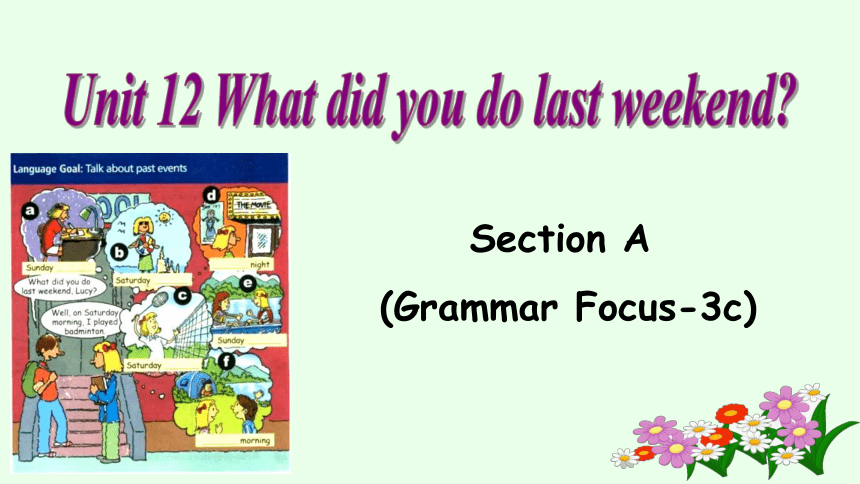 | |
| 格式 | zip | ||
| 文件大小 | 5.0MB | ||
| 资源类型 | 试卷 | ||
| 版本资源 | 人教新目标(Go for it)版 | ||
| 科目 | 英语 | ||
| 更新时间 | 2022-06-15 13:52:17 | ||
图片预览

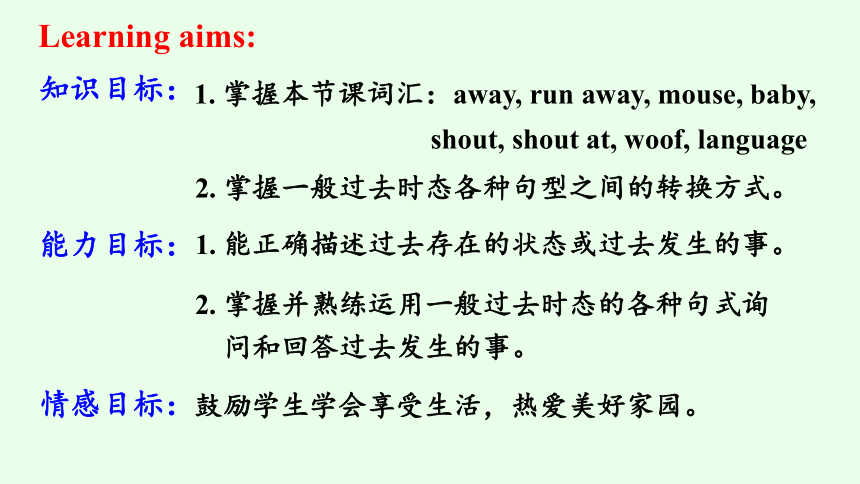
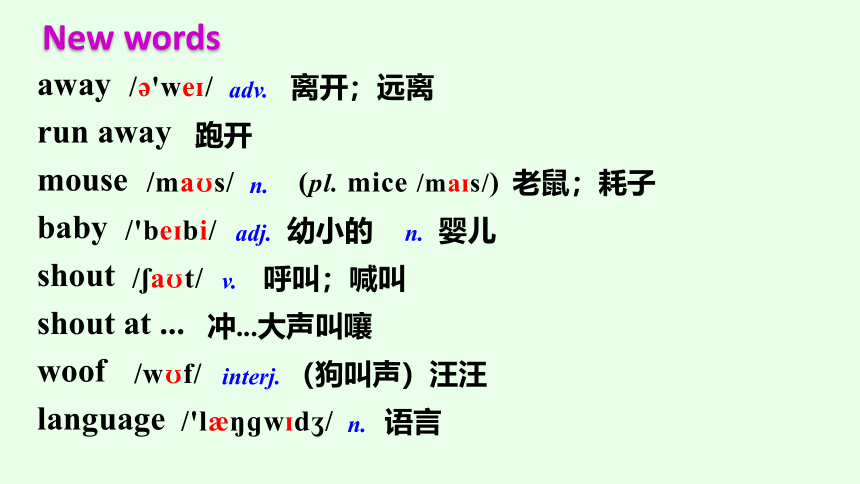
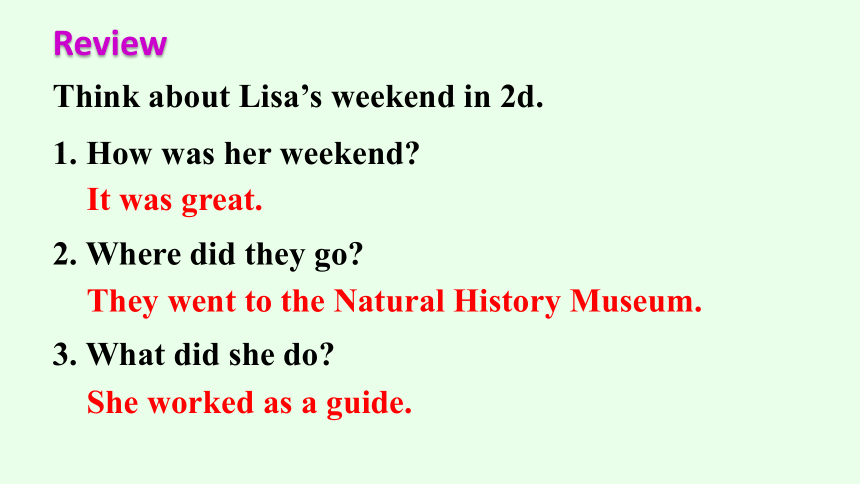
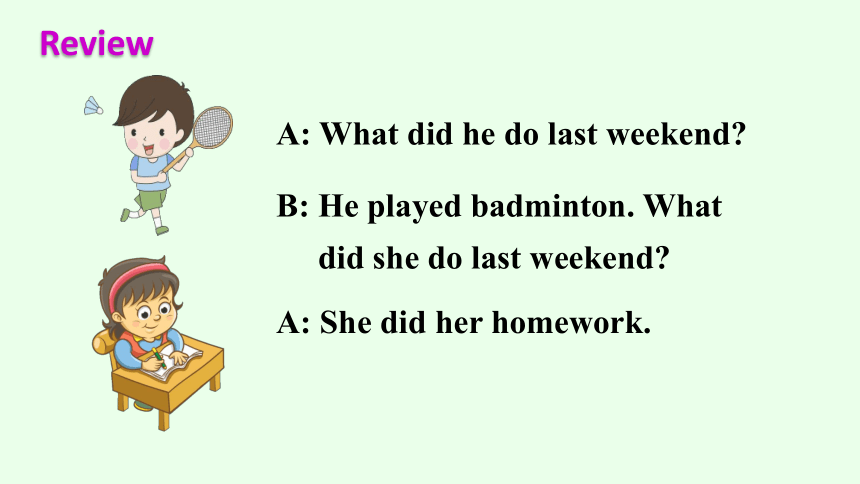
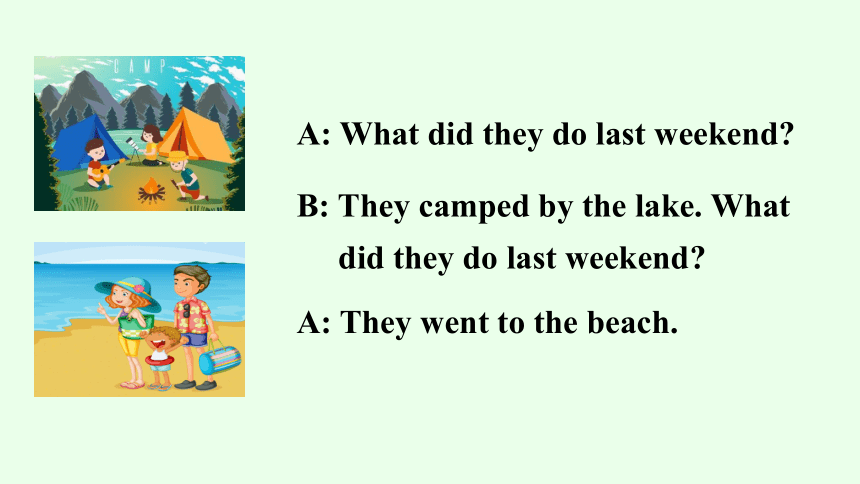
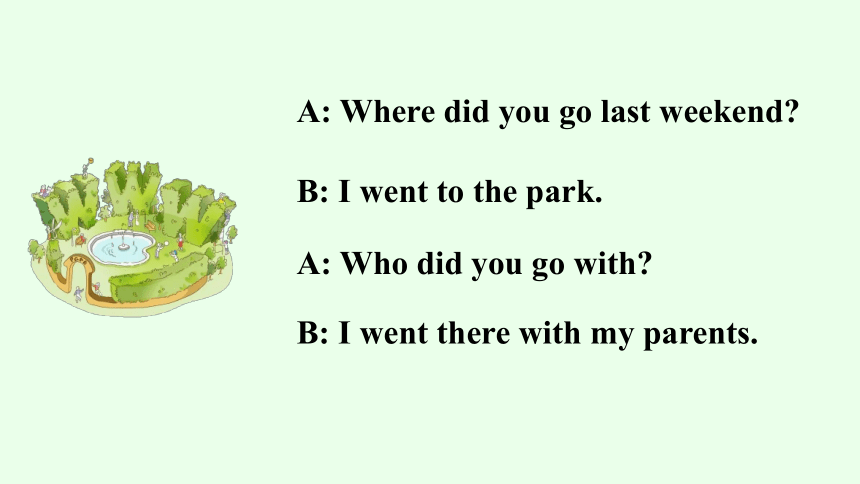
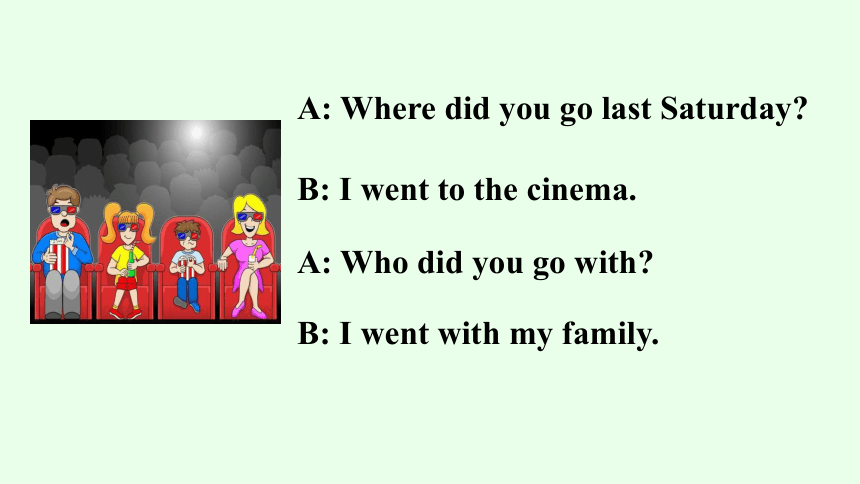
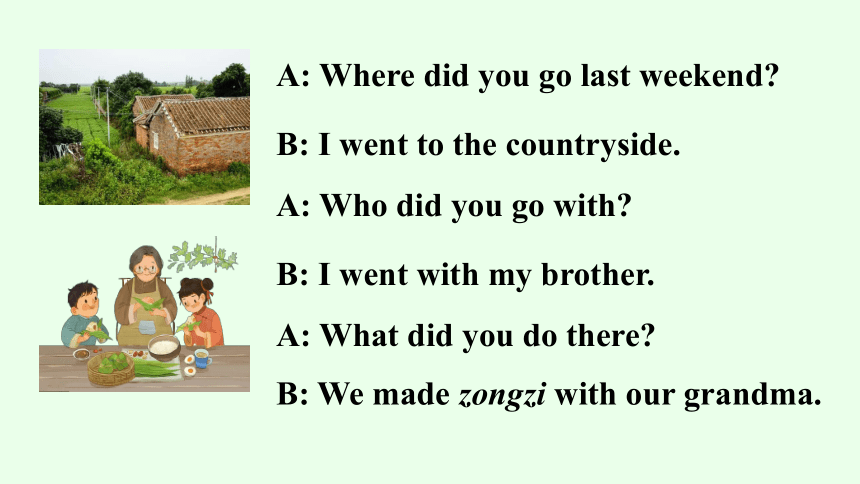
文档简介
(共27张PPT)
Unit 12 What did you do last weekend
Section A
(Grammar Focus-3c)
Learning aims:
知识目标:
1. 掌握本节课词汇:away, run away, mouse, baby,
shout, shout at, woof, language
2. 掌握一般过去时态各种句型之间的转换方式。
能力目标:
情感目标:
1. 能正确描述过去存在的状态或过去发生的事。
2. 掌握并熟练运用一般过去时态的各种句式询
问和回答过去发生的事。
鼓励学生学会享受生活,热爱美好家园。
New words
(pl. mice /ma s/)
away
run away
mouse
baby
shout
shout at ...
离开;远离
跑开
老鼠;耗子
幼小的
呼叫;喊叫
冲...大声叫嚷
语言
adv.
n.
adj.
interj.
v.
n.
woof
language
/w f/
/ l ɡw d /
/ a t/
/ be bi/
/ma s/
/ we /
婴儿
n.
(狗叫声)汪汪
Think about Lisa’s weekend in 2d.
Review
1. How was her weekend
2. Where did they go
3. What did she do
It was great.
They went to the Natural History Museum.
She worked as a guide.
A: What did he do last weekend
B: He played badminton. What
did she do last weekend
A: She did her homework.
Review
A: What did they do last weekend
B: They camped by the lake. What
did they do last weekend
A: They went to the beach.
A: Where did you go last weekend
B: I went to the park.
B: I went there with my parents.
A: Who did you go with
A: Where did you go last Saturday
B: I went to the cinema.
B: I went with my family.
A: Who did you go with
A: Where did you go last weekend
B: I went to the countryside.
A: Who did you go with
B: I went with my brother.
B: We made zongzi with our grandma.
A: What did you do there
Grammar Focus
上周末你(们)做了什么?
What did you do last weekend
我做家庭作业了。
/我们去划船了。
I did my homework.
/We went boating.
谁看望了她的奶奶?
Who visited her grandma
贝姬看望了(她的奶奶)。
Becky did.
上周末她去哪里了?
Where did she go last weekend
她去一家农场了。
She went to a farm.
她与谁一起去的?
Who did she go with
她与她的同班同学一起去的。
She went with her classmates.
Translate these sentences.
Grammar
一般过去时不同的句式变化:
一般过去时(ii)
1. 陈述句变为一般疑问句
(1)移动词语的位置:当句中有was, were, could, would, should等词时,将它们移到句首。
My weekend was very great.
Was your weekend very great
2. 肯定陈述句变为否定陈述句
(2)加助动词did:谓语是实义动词时,在主语之前加did,动词还原为原形。
(1)当句中含有情态动词could, would, should等,或句中含有连系动词was, were时,可直接在它们后面加not构成否定句。
He went to a farm last weekend.
Did he go to a farm last weekend
(2)当句中的谓语动词是实义动词时,在该动词之前加did not/didn’t,动词还原为原形,构成否定句。
He could swim last year.
He couldn’t swim last year.
I was at home yesterday.
I wasn’t at home yesterday.
They went to the village last month.
They didn’t go to the village last month.
3. 陈述句变为特殊疑问句
(1)确定疑问词:人who /whom,物what,地点where,时间when /what time,原因why,长度how long,距离how far等。
They went to the countryside last weekend.
When ...
He went camping by the lake.
Where ...
(2)疑问词 + 一般疑问句,再删除划线部分。
They went to the countryside last weekend.
When ...
Did they go to the countryside last weekend
When did they go to the countryside
Fill in the blanks with who, what, when, where or how.
A: ______ did you do last weekend
B: I played badminton on Saturday.
A: Sounds fun! _______ did you play with
B: I played with my father. He’s really good!
What
Who
3a
2. A: _______ was your weekend
B: It was great! I had so much fun!
A: ________ did you go
B: The weather was beautiful, so I went to the beach
with my parents.
3. A: ______ did Jim lose
B: He lost his keys. He often loses things.
A: That’s too bad. ________ did she lose them
B: I heard it was yesterday.
How
Where
What
When
Complete the passage with the correct forms of the words in the box.
say be climb see run away
A family of mice were in the kitchen on Saturday morning when they ____ a big cat. Baby Mouse _____ afraid and _______ onto his father’s back. Father Mouse shouted at the cat, “Woof, woof! ” The cat quickly ________. “Wow, Dad, you’re good!” ____ Baby Mouse. “Well, son, that’s why it’s important to learn a second language,” answered Father Mouse.
3b
saw
was
climbed
ran away
said
1. Father Mouse shouted at the cat, “Woof, woof!”
Language points
shout
v. 呼叫;喊叫
n. 呼喊;喊叫声
There is no need to shout. 没必要喊叫。
I heard a distant shout. 我听到了远处的一声喊叫。
辨析:shout at 与shout to
shout at 意为“冲...大声叫嚷;吼(非善意)。
shout to 意为“对...大声喊叫(无恶意)”。
Shouting to me is OK, but shouting at me isn’t OK.
向我呼喊可以,但冲我大喊大叫不行。
(1)That’s why ...意为“那就是为什么......;那就是...的原因”,此处why引导表语从句。
That’s why he didn’t come. 那就是他为什么没有来的原因。
(2)a second language 意为“第二语言”。
2. ...that’s why it’s important to learn a second language.
English is a useful language. It is often used as a second language.
英语是一门有用的语言,它常被用作第二语言 。
Think of two things you did last weekend. Draw pictures of them. Your classmates guess what you did.
3c
A: You went to the
mountains!
B: No.
C: ...
Exercises
1. Don’t ______ (喊叫) at the old. It’s impolite(不礼貌的).
2. Her aunt had a lovely _____ (婴儿).
3. What _________ (语言) does your pen pal speak
4. The bank is five kilometers _____ (远离) from here.
5. There is a small _______ (老鼠) under the bed.
shout
baby
language
away
mouse
一、根据句意及汉语提示完成单词。
1. Helen washed her clothes yesterday afternoon.
______ ____ Helen ____ yesterday afternoon
2. Mike cleaned the room with Tom this morning.
_____ ________ the room with Tom this morning
3. They went to the village last month.
_______ _____ they go last month
What did do
Who cleaned
Where did
二、对下列句子中的划线部分提问,每空一词。
4. Susan joined the club two weeks ago.
______ _____ Susan join the club
5. Our school trip was great.
_____ ______ your school trip
6. Tom went to Beijing by plane.
______ _____ Tom go to Beijing
When did
How was
How did
Homework
Do the exercises in your workbook.
All things are difficult before they are easy.
凡事必先难后易。
与君共勉
Unit 12 What did you do last weekend
Section A
(Grammar Focus-3c)
Learning aims:
知识目标:
1. 掌握本节课词汇:away, run away, mouse, baby,
shout, shout at, woof, language
2. 掌握一般过去时态各种句型之间的转换方式。
能力目标:
情感目标:
1. 能正确描述过去存在的状态或过去发生的事。
2. 掌握并熟练运用一般过去时态的各种句式询
问和回答过去发生的事。
鼓励学生学会享受生活,热爱美好家园。
New words
(pl. mice /ma s/)
away
run away
mouse
baby
shout
shout at ...
离开;远离
跑开
老鼠;耗子
幼小的
呼叫;喊叫
冲...大声叫嚷
语言
adv.
n.
adj.
interj.
v.
n.
woof
language
/w f/
/ l ɡw d /
/ a t/
/ be bi/
/ma s/
/ we /
婴儿
n.
(狗叫声)汪汪
Think about Lisa’s weekend in 2d.
Review
1. How was her weekend
2. Where did they go
3. What did she do
It was great.
They went to the Natural History Museum.
She worked as a guide.
A: What did he do last weekend
B: He played badminton. What
did she do last weekend
A: She did her homework.
Review
A: What did they do last weekend
B: They camped by the lake. What
did they do last weekend
A: They went to the beach.
A: Where did you go last weekend
B: I went to the park.
B: I went there with my parents.
A: Who did you go with
A: Where did you go last Saturday
B: I went to the cinema.
B: I went with my family.
A: Who did you go with
A: Where did you go last weekend
B: I went to the countryside.
A: Who did you go with
B: I went with my brother.
B: We made zongzi with our grandma.
A: What did you do there
Grammar Focus
上周末你(们)做了什么?
What did you do last weekend
我做家庭作业了。
/我们去划船了。
I did my homework.
/We went boating.
谁看望了她的奶奶?
Who visited her grandma
贝姬看望了(她的奶奶)。
Becky did.
上周末她去哪里了?
Where did she go last weekend
她去一家农场了。
She went to a farm.
她与谁一起去的?
Who did she go with
她与她的同班同学一起去的。
She went with her classmates.
Translate these sentences.
Grammar
一般过去时不同的句式变化:
一般过去时(ii)
1. 陈述句变为一般疑问句
(1)移动词语的位置:当句中有was, were, could, would, should等词时,将它们移到句首。
My weekend was very great.
Was your weekend very great
2. 肯定陈述句变为否定陈述句
(2)加助动词did:谓语是实义动词时,在主语之前加did,动词还原为原形。
(1)当句中含有情态动词could, would, should等,或句中含有连系动词was, were时,可直接在它们后面加not构成否定句。
He went to a farm last weekend.
Did he go to a farm last weekend
(2)当句中的谓语动词是实义动词时,在该动词之前加did not/didn’t,动词还原为原形,构成否定句。
He could swim last year.
He couldn’t swim last year.
I was at home yesterday.
I wasn’t at home yesterday.
They went to the village last month.
They didn’t go to the village last month.
3. 陈述句变为特殊疑问句
(1)确定疑问词:人who /whom,物what,地点where,时间when /what time,原因why,长度how long,距离how far等。
They went to the countryside last weekend.
When ...
He went camping by the lake.
Where ...
(2)疑问词 + 一般疑问句,再删除划线部分。
They went to the countryside last weekend.
When ...
Did they go to the countryside last weekend
When did they go to the countryside
Fill in the blanks with who, what, when, where or how.
A: ______ did you do last weekend
B: I played badminton on Saturday.
A: Sounds fun! _______ did you play with
B: I played with my father. He’s really good!
What
Who
3a
2. A: _______ was your weekend
B: It was great! I had so much fun!
A: ________ did you go
B: The weather was beautiful, so I went to the beach
with my parents.
3. A: ______ did Jim lose
B: He lost his keys. He often loses things.
A: That’s too bad. ________ did she lose them
B: I heard it was yesterday.
How
Where
What
When
Complete the passage with the correct forms of the words in the box.
say be climb see run away
A family of mice were in the kitchen on Saturday morning when they ____ a big cat. Baby Mouse _____ afraid and _______ onto his father’s back. Father Mouse shouted at the cat, “Woof, woof! ” The cat quickly ________. “Wow, Dad, you’re good!” ____ Baby Mouse. “Well, son, that’s why it’s important to learn a second language,” answered Father Mouse.
3b
saw
was
climbed
ran away
said
1. Father Mouse shouted at the cat, “Woof, woof!”
Language points
shout
v. 呼叫;喊叫
n. 呼喊;喊叫声
There is no need to shout. 没必要喊叫。
I heard a distant shout. 我听到了远处的一声喊叫。
辨析:shout at 与shout to
shout at 意为“冲...大声叫嚷;吼(非善意)。
shout to 意为“对...大声喊叫(无恶意)”。
Shouting to me is OK, but shouting at me isn’t OK.
向我呼喊可以,但冲我大喊大叫不行。
(1)That’s why ...意为“那就是为什么......;那就是...的原因”,此处why引导表语从句。
That’s why he didn’t come. 那就是他为什么没有来的原因。
(2)a second language 意为“第二语言”。
2. ...that’s why it’s important to learn a second language.
English is a useful language. It is often used as a second language.
英语是一门有用的语言,它常被用作第二语言 。
Think of two things you did last weekend. Draw pictures of them. Your classmates guess what you did.
3c
A: You went to the
mountains!
B: No.
C: ...
Exercises
1. Don’t ______ (喊叫) at the old. It’s impolite(不礼貌的).
2. Her aunt had a lovely _____ (婴儿).
3. What _________ (语言) does your pen pal speak
4. The bank is five kilometers _____ (远离) from here.
5. There is a small _______ (老鼠) under the bed.
shout
baby
language
away
mouse
一、根据句意及汉语提示完成单词。
1. Helen washed her clothes yesterday afternoon.
______ ____ Helen ____ yesterday afternoon
2. Mike cleaned the room with Tom this morning.
_____ ________ the room with Tom this morning
3. They went to the village last month.
_______ _____ they go last month
What did do
Who cleaned
Where did
二、对下列句子中的划线部分提问,每空一词。
4. Susan joined the club two weeks ago.
______ _____ Susan join the club
5. Our school trip was great.
_____ ______ your school trip
6. Tom went to Beijing by plane.
______ _____ Tom go to Beijing
When did
How was
How did
Homework
Do the exercises in your workbook.
All things are difficult before they are easy.
凡事必先难后易。
与君共勉
同课章节目录
- Unit 1 Can you play the guitar?
- Section A
- Section B
- Unit 2 What time do you go to school?
- Section A
- Section B
- Unit 3 How do you get to school?
- Section A
- Section B
- Unit 4 Don't eat in class.
- Section A
- Section B
- Unit 5 Why do you like pandas?
- Section A
- Section B
- Unit 6 I'm watching TV.
- Section A
- Section B
- Review of Units 1-6
- Unit 7 It's raining!
- Section A
- Section B
- Unit 8 Is there a post office near here?
- Section A
- Section B
- Unit 9 What does he look like?
- Section A
- Section B
- Unit 10 I'd like some noodles.
- Section A
- Section B
- Unit 11 How was your school trip?
- Section A
- Section B
- Unit 12 What did you do last weekend?
- Section A
- Section B
